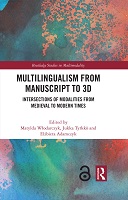Chapter 4 Metalinguistic and Visual Cues to the Co- Occurrence of Latin and Old Polish in the Electronic Repository of Greater Poland Oaths, 1386– 1446 (eROThA)
Proposal review
Author(s)
Włodarczyk, Matylda
Adamczyk, Elżbieta
Language
EnglishAbstract
Multilingual handwritten texts offer fruitful ground for the study into the visual aspects of the co-occurrence of languages, i.e. the pragmatics on the page (Carroll et al. 2013). This paper draws on the Electronic Repository of Greater Poland Oaths, 1386-1446 (eROThA) based on the oldest collection of secular texts from medieval Greater Poland, attesting the vernacular beyond glosses. Although this early court documentation was written predominantly in Latin, it includes Old Polish in witness oaths which may be metatextually and/or visually delimited. The repository gives access to the lesser known, specialised administrative texts from East-Central Europe, enriched with information drawn from the facsimiles of original manuscripts.
In terms of language devices, the vernacular witness oath tends to be marked metatextually by means of items characterised by code ambiguity. Visually, boundary marking differs in salience, i.e. ranging from text blocking, which is visible on the level of mise-en-page, to features of punctuation and/or script with subtle separation effects. This study focuses on the former type of code and discourse boundary, viewed as interfaces of its bilingual nature with the visual modality of page organisation. A quantification of its patterns allows an exploration of the temporal and regional variation as reflected in six localisations of the eROThA collection over a period of sixty years.
Keywords
modalities; modalities of communication; multilingual communication; historical communication; multimodal resources; multimodality; semiotic resourcesDOI
10.4324/9781003166634-5ISBN
9780367763596, 9780367763626, 9781003166634Publisher
Taylor & FrancisPublisher website
https://taylorandfrancis.com/Publication date and place
2023Imprint
RoutledgeClassification
Language: reference and general
Linguistics


 Download
Download